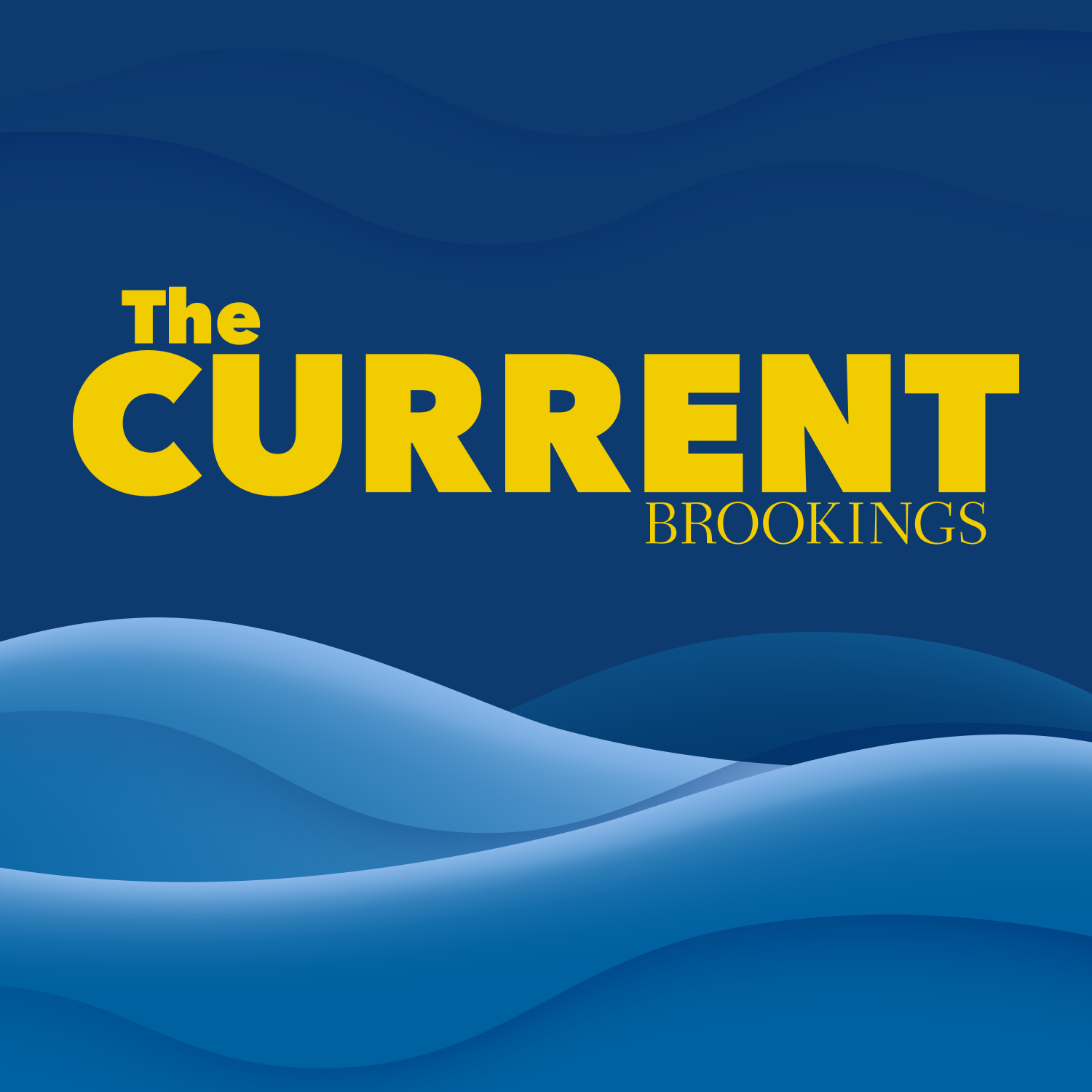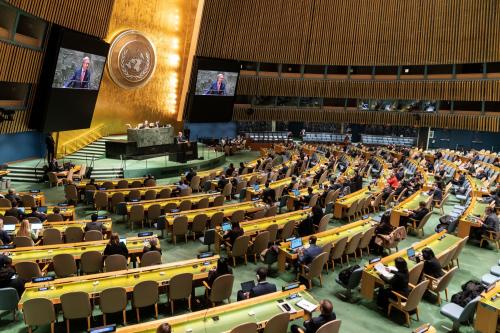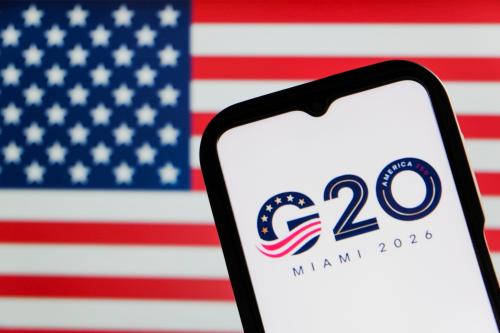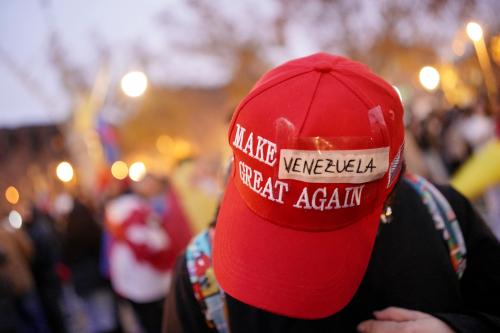The 2023 U.N. General Assembly featured increased calls from countries of the “Global South” for a greater role in global governance and the major multilateral institutions. Bruce Jones explains how the U.S., China, and Russia are competing for the global South’s attention, why calls to reform of the U.N. Security Council may now have a chance, and highlights a new multilateral framework called the Partnership for Atlantic Cooperation.
TRANSCRIPT
PITA: The 78th United Nations General Assembly has wrapped up its World Leaders Week, as well as a number of high-level summits on reinvigorating progress on the sustainable development goals, climate change, and global health priorities. With us to discuss some of the geopolitical dynamics at play at this year’s General Assembly and some big picture questions about the role of the U.N. is Bruce Jones, a senior fellow with the Strobe Talbott Center for Security Strategy and Technology here at Brookings. Thanks for talking to us today, Bruce.
JONES: Pleasure to be here.
PITA: Russia’s continued war on Ukraine was, of course, a major focus of all of the meetings. President Zelenskyy came and spoke in person in New York. He and many others, including the president of Albania, who was chairing the Security Council, raised a lot of questions about what does it mean for the U.N. in terms of its effectiveness, even just its standing as a body, the key body of global governance, that one of its core member nations can invade a neighboring sovereign country and seemingly suffer no institutional repercussions in terms of their role at the U.N. The U.N.’s relevance been questioned many times in the past, of course. Tell us a little bit more about the dynamics now at this time going on with that.
JONES: Well, first, on the question of Russia’s invasion of Ukraine and what it means for the U.N., it means we live in the real world. International institutions don’t magically have power to stop great powers from doing things that they want to do. Other great powers have the power to stop them. And if we look at it in these terms, if we wanted to design a body that in some way had greater capability to constrain the world’s top powers from taking foreign policy actions, we might be able to do that. But the first country to not want that would be the United States. And the last time the United States tried to organize some kind of effort to block a major power from invading another country was, of course, with the U.S. war in Iraq. And we didn’t like that much. And we threatened to leave the U.N. So we just have to be realistic that you’re not going to have international institutions that can tell the United States what to do or can tell the Chinese what to do or frankly, even can tell the Russians what to do. That has to be organized by governments. They can do that within a framework set out by the charter. And I think a lot of what we’re seeing in Ukraine is a lot of the rest of the world rallying to the defense of the principle that one country should not be allowed to invade another. And they’re doing that in the spirit of Article Two of the charter. But it is not the U.N. institution itself that can magically wave a wand and stop a great power from acting in those ways.
PITA: Sure. A lot of the talk was, though, Russia still has its seat on the Security Council, for example, still has voting rights, no privileges there at U.N. were being taken away, which gets the question about some of the reforms. Some of the ideas for reforms have come up, including expanding the Security Council from the permanent seats there, just from the original five who were the victors of World War Two plus China. I saw someone refer to it that way. What are your thoughts about some of those reforms and their effectiveness?
JONES: Well, let me make two points here. First, I mean, we invaded Iraq and didn’t lose any privileges at the U.N. and everybody still remembers that. We, the United States, deliberately set up this body. We wrote most of the rules to limit the actions of many people while still giving the top powers freedom to maneuver. That’s the entire structure of it. And that’s the point. Because if it was trying to go farther than that, the major powers wouldn’t participate, first and foremost, the United States. That doesn’t mean that it’s great that Russia gets to do this without consequences. Second, they did take some consequences in reputational terms and institutions. They were ejected from the Human Rights Council, which is humiliating for them. They’re now launching a rearguard campaign to get back on it. I don’t think they’ll succeed. So there was some reputational cost to them in those terms.
The deeper question about reform is whether or not it would be valuable to see a wider set of powers at the Security Council. We’re talking here about the quote unquote rising powers, the new middle powers, the Global South, the Indias, Turkey, Brazil, etc., as well as countries like Japan and Germany that have grown substantially in power over the last 30 or 40 years and yet do not have permanent seats. This often gets dismissed as mere chatter or mere talk. I don’t think that’s right. I think this round of reform is different for the following reason. At least in the post-Cold War period, all prior efforts to reform the Security Council took the form of one of the countries that wanted a seat, or the U.N. itself, advancing the notion of reform, going to the United States to say, will you back us? And the Americans saying, in effect, “this is very interesting. We will study it carefully. We will not block you. Please go away.” And put zero effort into making it happen. That is not what’s happening now. This round of reform was initiated by Joe Biden at his speech at the General Assembly last year. I think at the time people thought this probably isn’t serious. And in the years since, people like Salman Ahmed, the head of policy planning have been traveling around articulating this, pushing this, working it. And Biden went back to the U.N. this year and talked again about council reform. And suddenly people are realizing, hold on a second, the United States is actually serious about this. That doesn’t mean it will happen. But there is a world of difference between a reform initiative where some other country is pushing it and the United States is disinterested versus one where the United States itself is in the lead.
PITA: Are there any other reforms currently being talked about besides the expansion of the P5?
JONES: The big issue on the table in the U.N. firmament, if I can put it that way, is that the countries of the Global South writ large – and we can unpack that slightly problematic term – but the countries of the Global South writ large are increasingly organized and taking the stage to say, “you know what, I’m sorry, enough is enough. We are not going to participate in an international system in which the West calls the shots, sets the rules, and has the leadership in the governance of all the major institutions. These institutions matter a huge amount to us. They primarily work in our countries, and we demand a seat at the table and a role in the governance.” Most of the institutions that they are focused on are not actually U.N. institutions. They’re thinking about the fund, the bank, multilateral development banks, a whole host of financial and developmental institutions, of which the U.N. is only a small part. Nonetheless, the U.N. is the stage on which they can make that case and make that argument. And I think they are taking advantage of the fact that there is a new level of geopolitical tension which is causing countries like the United States that hasn’t worried much about the interests and appetites of the Global South the last 30 or 40 years to say, oh, gosh, we’ve got to figure out what these guys want to see if we can meet them partway. And the Chinese and the Russians are in a similar space. People are competing for the attention and loyalty of the Global South in the way they haven’t done for quite a while. And those countries are organizing themselves to make the case for governance reform of the international system writ large. For them, it’s less the U.N. in its peace and security functions and much more about the international financial institutions. But the General Assembly is the place where they have the platform and the voice to make their argument.
PITA: In addition to these bigger multilateral organizations, we are, I think, seeing an additional rise of a lot of the smaller regional bodies, certainly in terms of taking effective actions or at least more short term, quicker actions. For instance, we’re seeing ECOWAS take the lead in Africa in light of the political instability in Western Africa. One of the interesting meetings on the sidelines of the U.N. this time was they called it the inaugural C5 plus one. That was the five major nations of Central Asia, Kyrgyzstan, Kazakhstan, Uzbekistan, Tajikistan and Turkmenistan. ASEAN, of course, has been around for a long time, but is having growing relevance in Southeast Asia or even ones that are still Western driven like the Quad, they are sort of kind of taking the lead in a lot of Indo-Pacific relations. All of these different smaller groups, of course, can’t take the place of the U.N., the bank, the fund, the larger scale funding and actions. What’s their role in meeting these global and regional challenges and to giving that voice and giving a platform for action for these countries of the Global South?
JONES: ‘Twas always thus. I think one of the recurrent themes at the U.N is every two or three years, it looks like regional organizations are playing a greater role, but they’ve always played it. I think the big difference is that the member states of those organizations are richer and better organized than they were 20 and 30 years ago. Right. So what we’ve watched the last 30 years is 60 or 70 countries rising from low income status with the weakness of institutions and limited diplomatic clout that goes along with that to something more like lower middle and middle income status, with the greater capability, the greater diplomatic heft that goes along with that. And so a regional organization comprised of ten or 12 small states with not much money can’t do much. The same organization comprised of ten states with rather more money and rather more influence can do more. So, we’re seeing them able to achieve more than they were. They’ve always been there, and they’ve always played these roles, but they’re able to achieve more.
The other thing that’s happening, I think, is the U.N. itself has increasingly become stymied because of the tensions between the United States, China, and Russia. And so whereas ten years ago, whatever it was, the regional organizations were doing was hugely overwhelmed by the scale of what was happening through the U.N. A lot of the U.N.’s action have been diminished and so the regional organizations look bigger in comparison, but it’s not actually that they’re doing all this much more. It’s just that the U.N. is doing less, at least in the peace and security and main. In the global issue space is more complicated because of course by definition issues like climate change, infectious disease have to go to the level of global cooperation. It doesn’t work – you can do some elements of things at a subregional level or at a regional level, but really the action is at the global level. And I think this is why we saw so much of the weight of what happened at the General Assembly this year in the last several years as being around climate change, infectious disease, development questions, the sustainable development goals, because even though there are financial and developmental institutions outside of the realm of the U.N. at the global level, the U.N. is really the only platform for those conversations.
PITA: Were there any other dynamics or aspects raised at this year’s General Assembly that caught your attention or that you’ll be keeping an eye on going forward?
JONES: I think the most important thing that happened at the General Assembly this year, beyond the broad texture of the competition for the allegiance of the Global South, was the launch of something called the Partnership for Atlantic Cooperation, which was led by the United States. And Tony Blinken hosted a meeting of 30 plus foreign ministers with another dozen or so countries also in attendance. And they launched a new institution, or at least a new multilateral framework called the Partnership for Atlantic Cooperation. This has been a year and a bit information. Jake Sullivan has been in the lead and the diplomacy on this, trying to get the countries of the Atlantic Basin – North America and South America and African and European – to collaborate, to fill the space of the Atlantic with initiatives around maritime transparency, maritime awareness, countering illegal fishing, countering piracy, climate initiatives, biodiversity initiatives, essentially to try to fill that space, to make it harder for other actors to fill it in other ways. And the other actors worried about here are transnational criminal entities of a variety of types and frankly, Russia and China, who are increasingly encroaching into the North Atlantic and the South Atlantic vis-a-vis extensive fishing and questionable ways, with gray activities that accompany that, and frankly, also increasingly from a naval dimension. And so the United States is preoccupied by protecting the Atlantic as a vital space for American and Western interests. And it took a lot of diplomacy to get there. There was some resistance, a very last-minute agreement by Brazil to join. That was a key objective, and they secured that at the very last minute. And this mechanism was launched at the U.N., on the margins of the U.N., I liken it to the way 15 years ago or so the phrase “free and open Indo-Pacific” was just rhetoric by the Japanese, but has since become a central organizing concept for a lot of naval commercial scientific activity in the Indian and Pacific Oceans. And I think the Partnership for the Atlantic Cooperation has the potential to do the same.
PITA: All right. Bruce, thanks so much for being with us today and talking about this.
JONES: Pleasure. Thanks for having me.
The Brookings Institution is committed to quality, independence, and impact.
We are supported by a diverse array of funders. In line with our values and policies, each Brookings publication represents the sole views of its author(s).







Commentary
PodcastUN reform and the Global South at the 2023 General Assembly
September 29, 2023
Listen on
The Current Podcast